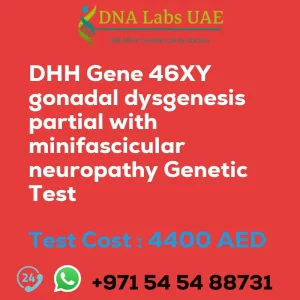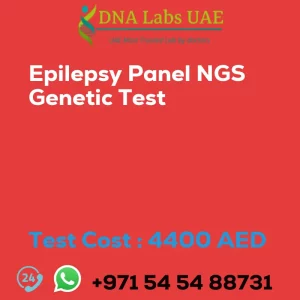TWNK Gene Progressive External Ophthalmoplegia with Mitochondrial Deletions Type 3 Autosomal Dominant Genetic Test
Test Name: TWNK Gene Progressive External Ophthalmoplegia with Mitochondrial Deletions Type 3 Autosomal Dominant Genetic Test
Components: Blood or Extracted DNA or One drop Blood on FTA Card
Price: 4400.0 AED
Sample Condition: Blood or Extracted DNA or One drop Blood on FTA Card
Report Delivery: 3 to 4 Weeks
Method: NGS Technology
Test Type: Neurological Disorders
Doctor: Neurologist
Test Department: Genetics
Pre Test Information: Clinical History of Patient who is going for TWNK Gene Progressive External Ophthalmoplegia with Mitochondrial Deletions Type 3, Autosomal Dominant NGS Genetic DNA Test. A Genetic Counselling session to draw a pedigree chart of family members affected with TWNK Gene Progressive External Ophthalmoplegia with Mitochondrial Deletions Type 3, Autosomal Dominant.
Test Details: Progressive External Ophthalmoplegia with Mitochondrial Deletions Type 3, Autosomal Dominant (PEO3) is a genetic disorder characterized by progressive weakness and paralysis of the muscles that control eye movement (ophthalmoplegia). It is caused by mutations in the TWNK gene, which provides instructions for making a protein called Twinkle. This protein is essential for the replication and maintenance of mitochondrial DNA (mtDNA). NGS (Next-Generation Sequencing) Genetic Test is a type of genetic testing that uses high-throughput sequencing technologies to analyze multiple genes simultaneously. It allows for the rapid and cost-effective sequencing of large amounts of DNA, providing comprehensive genetic information. In the context of PEO3, an NGS Genetic Test would involve sequencing the TWNK gene to identify any mutations or deletions that may be present. This test can help confirm a diagnosis of PEO3 and provide information about the specific genetic variant causing the condition. Genetic testing for PEO3 can be beneficial for individuals with symptoms suggestive of the disorder, as well as their family members who may be at risk of inheriting the condition. It can aid in early diagnosis, genetic counseling, and potentially guide treatment decisions. It is important to consult with a healthcare professional or genetic counselor to discuss the appropriateness, benefits, and limitations of genetic testing for PEO3. They can provide guidance on the testing process, interpretation of results, and implications for the individual and their family.
| Test Name | TWNK Gene Progressive external ophthalmoplegia with mitochondrial deletions type 3 autosomal dominant Genetic Test |
|---|---|
| Components | |
| Price | 4400.0 AED |
| Sample Condition | Blood or Extracted DNA or One drop Blood on FTA Card o |
| Report Delivery | 3 to 4 Weeks |
| Method | NGS Technology |
| Test type | Neurological Disorders |
| Doctor | Neurologist |
| Test Department: | Genetics |
| Pre Test Information | Clinical History of Patient who is going for TWNK Gene Progressive external ophthalmoplegia with mitochondrial deletions type 3, autosomal dominant NGS Genetic DNA Test A Genetic Counselling session to draw a pedigree chart of family members affected with TWNK Gene Progressive external ophthalmoplegia with mitochondrial deletions type 3, autosomal dominant |
| Test Details |
Progressive external ophthalmoplegia with mitochondrial deletions type 3, autosomal dominant (PEO3) is a genetic disorder characterized by progressive weakness and paralysis of the muscles that control eye movement (ophthalmoplegia). It is caused by mutations in the TWNK gene, which provides instructions for making a protein called Twinkle. This protein is essential for the replication and maintenance of mitochondrial DNA (mtDNA). NGS (Next-Generation Sequencing) Genetic Test is a type of genetic testing that uses high-throughput sequencing technologies to analyze multiple genes simultaneously. It allows for the rapid and cost-effective sequencing of large amounts of DNA, providing comprehensive genetic information. In the context of PEO3, an NGS Genetic Test would involve sequencing the TWNK gene to identify any mutations or deletions that may be present. This test can help confirm a diagnosis of PEO3 and provide information about the specific genetic variant causing the condition. Genetic testing for PEO3 can be beneficial for individuals with symptoms suggestive of the disorder, as well as their family members who may be at risk of inheriting the condition. It can aid in early diagnosis, genetic counseling, and potentially guide treatment decisions. It is important to consult with a healthcare professional or genetic counselor to discuss the appropriateness, benefits, and limitations of genetic testing for PEO3. They can provide guidance on the testing process, interpretation of results, and implications for the individual and their family. |








